Death toll continues to rise as window for rescue narrows; UN calls for aid to Syria by ‘fastest, most direct and most effective routes’

Live feed
From 14m ago
Combined death toll in Turkey and Syria passes 17,000
The death toll in Turkey from Monday’s earthquakes has risen to 14,014, the Turkish president, Recep Tayyip Erdoğan, has said, with more than 63,000 people injured.
Visiting the quake-hit province of Gaziantep, Erdoğan said more than 6,400 buildings had been destroyed and that Turkey aimed to build new three and four-storey buildings in the region within one year, Reuters reports.
With the most recent death tolld from Syria – provided by Syrian government officials and a rescue group in the rebel-held north-west of the country – reaching 3,162, the combined tally in both countries now stands at 17, 176.
Experts have said that it is likely to continue to rise.
Key events
Matt Fidler
A selection of the latest images from the devastation in Syria and Turkey this morning.
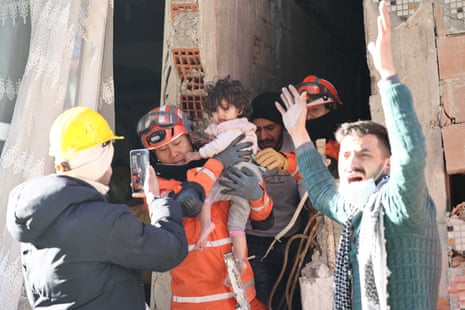
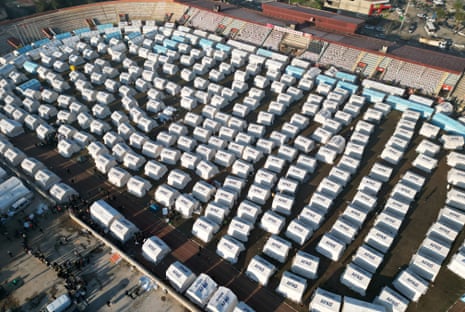
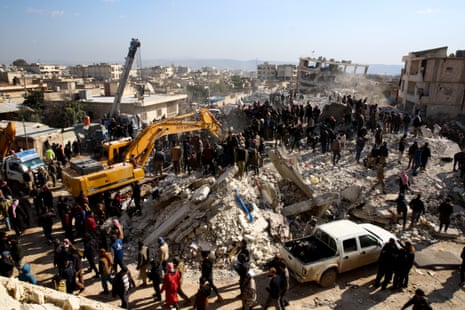
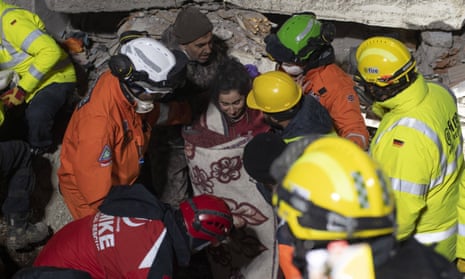
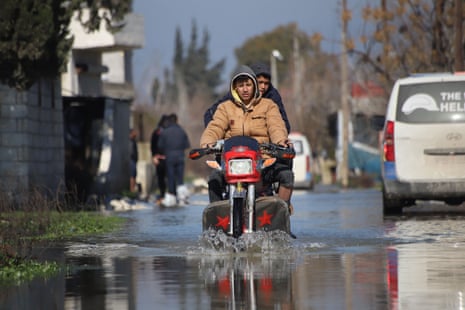
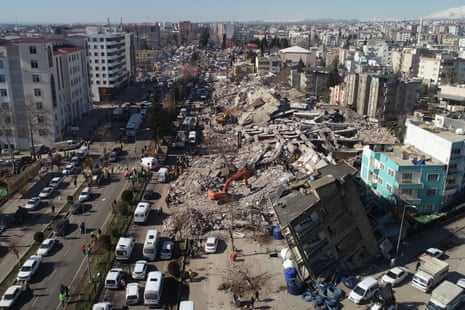
Combined death toll in Turkey and Syria passes 17,000
The death toll in Turkey from Monday’s earthquakes has risen to 14,014, the Turkish president, Recep Tayyip Erdoğan, has said, with more than 63,000 people injured.
Visiting the quake-hit province of Gaziantep, Erdoğan said more than 6,400 buildings had been destroyed and that Turkey aimed to build new three and four-storey buildings in the region within one year, Reuters reports.
With the most recent death tolld from Syria – provided by Syrian government officials and a rescue group in the rebel-held north-west of the country – reaching 3,162, the combined tally in both countries now stands at 17, 176.
Experts have said that it is likely to continue to rise.
The World Health Organization (WHO) has underlined the importance for humanitarian organisations of making sure that people who have survived the quake “continue to survive”.
The WHO’s incident response manager, Robert Holden, told reporters in Geneva many were surviving “out in the open, in worsening and horrific conditions” with severely disrupted water, fuel and electricity supplies:
We are in real danger of seeing a secondary disaster which may cause harm to more people than the initial disaster if we don’t move with the same pace and intensity as we are doing on the search and rescue side. People need the basic elements to survive the next period.
British rescue crews are still finding live victims in “survivable voids” created by the way buildings have collapsed, the head of the UK International Search and Rescue team in Turkey, David O’Neill, has said:
We are still finding live victims. It is surprising, but it’s encouraging the way these buildings have collapsed. The people that were recovered yesterday were very dehydrated, slightly hypothermic because of the extremely cold conditions here. They’re still alive.
O’Neill told Sky News that the fcat that that people were in bed and wrapped in blankets at the time of the first earthquake on Monday has increased their chances of surviving.
First aid convoy reaches Syria
An aid convoy has reached northwestern Syria, the first since Monday’s devastating earthquake that has killed nearly more than 1,000 people in the the rebel-held area, an official at the Bab al-Hawa border crossing has told Agence France-Presse.
An AFP correspondent reported seeing six trucks passing through the crossing from Turkey carrying tents and hygiene products. The border official, Mazen Alloush, said the delivery had been expected before Monday’s quake.
The UN had earlier said it had received assurances that the first aid would reach northwestern Syria through the sole authorised crossing from Turkey on Thursday.
The window to save victims of the earthquake in Turkey and Syria is “fast running out”, the World Health Organisation’s regional director for Europe has said.
Dr Hans Kluge told BBC Radio 4’s Today programme that only 22% of people trapped in rubble survive for 72 hours after an earthquake, and the percentage falls rapidly from then on.
“Every minute counts now because the window to save lives is fast running out,” Kluge said. “Everyone is working flat out to find and rescue any survivors.” The death toll is likely to “go much higher”, he said.
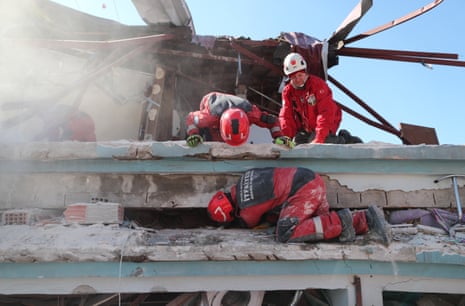
Relief efforts in Turkey and Syria are being hampered by a “raft of issues”, a former British Army logistics expert has said.
Retired Major General Sir Tim Cross told Sky News: “The sadness of the slow response… You need people on the ground allocating resources, understanding what is needed. You need to clear the roads to get in and out of these areas.
“You need support helicopters to get people away from the danger area and further danger. So there is a whole raft of issues that are going on here.”
He added: “You’ve got the people who are buried but you also have the survivors. Those survivors need to be given shelter, water, food, sanitation, medical support, power – all of those issues that are essentially logistics issues.”
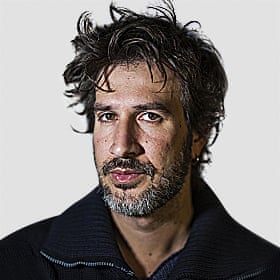
The Guardian’s Lorenzo Tondo is in southern Turkey with photographer Alessio Mamo:
Yesterday we visited the towns of Pazarcik, the epicentre of the earthquake, and Kahramanmaraş, where hundreds of rescuers continue to work tirelessly in the hope of still finding more survivors.
We could smell corpses as they dug through piles of debris in the centre of the town. Emergency workers there continued to comb the wreckage, often finding only body parts. In front of the buildings, razed to the ground, people offer condolences to the families of the victims, who are sitting in the street around fires.
Their loved ones are still wedged somewhere under the remaining debris. After three days, hopes of finding them alive are fading away.
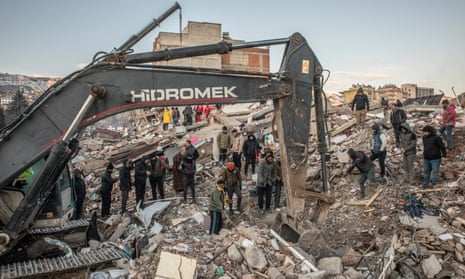
You can read Lorenzo’s full report here.
UN calls for urgent aid to Syria
The United Nation’s special envoy for Syria, Geir Pedersen, has said the country – already ravaged by more than a decade of civil war – urgently needs post-earthquake life-saving aid.
“Syrians need more of absolutely everything,” Pedersen told reporters in Geneva. “The earthquake struck as the humanitarian crisis in north-west Syria was already worsening, with needs at their highest levels since the conflict began.”
Aid was needed “urgently, through the fastest, most direct and most effective routes”, he said. “We have seen some aid, but nowhere near enough … Emergency aid must not be politicised. We must instead focus on what is needed.”
The UN had been assured the first assistance would cross from Turkey into Syria later on Thursday, Pedersen said.
The Turkish president, Recep Tayyip Erdoğan, is to visit three more areas in southern Turkey that were badly hit by Monday’s earthquake, the state broadcaster TRT Haber has reported.
Erdoğan will visit the southern cities of Gaziantep, Osmaniye, and Kilis, near the border with Syria, the broadcaster said.
The first convoy of humanitarian assistance for people in northwest Syria since Monday’s devastating earthquake is en route to the southern Turkish border with the hope of crossing on Thursday, two aid sources have told Reuters.
A Turkish official said the Bab al-Hawa border crossing was open for humanitarian aid and authorities will open a few more crossings after two days if security is sound. The convoy reportedly includes at least six trucks of medical and humanitarian aid supplies.
The United Nations has described access to the opposition-controlled area of Syria through Bab al-Hawa as a “lifeline” for some 4 million people who it says rely on humanitarian assistance.
Rescue workers in Turkey have pulled an injured 60-year-old woman, Meral Nakir, from the rubble of an apartment block in the city of Malatya, 77 hours after the first quake struck, the Turkish state broadcaster TRT has reported.
Hopes of finding many more survivors in winter temperatures that have plunged to -5C are fading, however, particularly in north-west Syria where rescue efforts are hampered by the devastation wrought by 11 years of civil war.
“The death toll and injured is expected to rise much higher with many families still under collapsed buildings,” Raed Saleh, head of the rescue service in the north-west, told Reuters on Thursday morning. “No assistance has come yet and we are waiting today to see if any is coming.”

Combined death toll passes 16,000
The Associated Press has reported that the provisional death toll in Syria – provided by Syrian government officials and a rescue group in the rebel-held north-west of the country – has reached 3,162.
Turkey’s disaster agency said earlier on Thursday that the number of people confirmed dead had climbed to 12,873 overnight. That means the combined tally of fatalities from the quakes in both countries has now reached 16,035.
More than 60,000 people are reported injured in Turkey and more than 5,000 injured in Syria.
British charities’ experience on the ground will allow them to overcome the difficulties of getting aid to quake victims in Syria, Saleh Saeed, the chief executive of the UK’s Disasters Emergency Committee (DEC), has said.
Northern Syria is controlled by rebel groups and multiple reports suggest aid is flowing less easily into the area than into the south of Turkey, which was also badly affected by the disaster. Saeed told BBC Breakfast:
Indeed Syria is still in a state of conflict, but our members have been working in Syria for 10 years. They have people on the ground, both local staff and volunteers. So despite the challenges of course they are experiencing now because of the damaged roads and immense traffic and so forth, aid is getting through and they are scaling up. The needs in Syria are immense.
Rescuers are continuing to comb through the rubble of collapsed buildings in Syria and Turkey, but the so-called critical 72-hour window since the earthquake has now passed and the chances of finding people alive are falling fast, experts say.
“The first 72 hours are considered to be critical,” said Steven Godby, a natural hazards expert at Nottingham Trent University, told Sky News. “The survival ratio on average within 24 hours is 74%, after 72 hours it is 22%, and by the fifth day it is 6%.”
In previous quakes people have been recovered alive after 15 days under rubble, but subzero winter temperatures since Monday mean those who survived the initial tremor but are still trapped risk dying from hypothermia, doctors have said.

Britain’s Disasters Emergency Committee (DEC) is launching an appeal to help the hundreds of thousands of people affected by the quakes, with the government pledging to match the first £2m donated by the public.
The collective of 15 UK charities, including Oxfam, ActionAid, Save the Children UK and the British Red Cross, said the funds raised would go towards medical supplies, shelter, food and clean water, as well as blankets, warm clothes and heaters.
The appeal will be broadcast on British TV channels on Thursday evening.
First aid convoy due in Syria today
The first convoy of humanitarian assistance for north-west Syria, where the impact of 11 years of civil war on healthcare, emergency services and infrastructure is hugely complicating relief efforts, is en route to the southern Turkish border with the hope of crossing into Syria later on Thursday, two aid sources have told Reuters.
Access to Twitter in Turkey has been restored, Netblocks, which monitors cybersecurity and internet governance, said on Thursday after talks between the social media platform and Turkish authorities.
Access had been restricted on several mobile networks on Wednesday, removing a key communication channel for coordinating relief efforts.
Netblocks said the coordinated nature of the block suggested it was on government orders, noting that Turkey has a history of imposing social media restrictions during emergencies.
Opposition figures, academics and activists were sharply critical of the block, which came amid mounting condemnation of the Turkish government’s response to the disaster, seen by many as slow and inadequate.
Turkey’s deputy transport and infrastructure minister, Omer Fatih Sayan, said he had reminded Twitter of its responsibilities as earthquake relief work continues.
“Our demands are clear, strong cooperation on disinformation and false reports, swift action against fake accounts and ... measures against content that could damage public order and security,” Sayan said.
The company’s chief executive, Elon Musk, said earlier that it had been informed by the government that full access would be re-enabled shortly.


